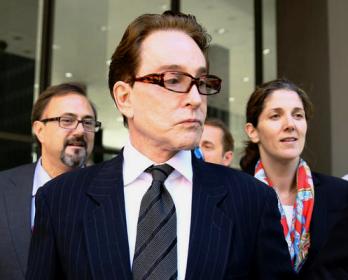Last week, a federal judge in Chicago sentenced Beanie Baby king Ty Warner to two-years’ probation rather than prison for hiding at least $25 million from the IRS.
“Society will be better served,” U.S. District Judge Charles Kocoras said, “by allowing him to continue his good works.”

Many news outlets, including Chicago Business, describe Warner as “The 69-year-old philanthropist and chairman and CEO of Westmont-based Ty Inc. was charged in September and agreed to plead guilty to federal tax evasion and pay a fine of more than $53 million for failing to report money he earned in a secret account offshore. He cooperated with the IRS, according to a statement at the time from the U.S. attorney’s office in Chicago.”
In August 2012, Chicago Business reported on a story where the billionaire had stopped a woman in Santa Barbara asking for driving directions. “[Jennifer Vasilakos] was in a parking lot at the time, raising money for a stem-cell procedure she hopes to have. She said she told him her story about being rejected for a kidney transplant because she had had a bout of skin cancer and that now she was looking for alternative treatment overseas. She says Mr. Warner wrote a $50 check before leaving and then returned later to say he would be sending her a check for $20,000.
“My hope is that we can bring this lifesaving treatment to the forefront,” Warner said, at the time, “so that it can become more readily available and provide alternatives for people like Jennifer.”
In making his ruling, Judge Kocoras said that he was in possession of “…at least 70 character references vouching for Mr. Warner’s contributions to society,” Chicago Business reported. The judge also “…noted that Mr. Warner had already paid the back taxes on the $25 million he had held in a Swiss bank account, and that the Chicago businessman’s $53 million fine for the crime likely was the largest in U.S. history. The judge also cited the ‘manifest’ public humiliation that Mr. Warner likely endured.”
Ty Warner is only the latest high-profile billionaire caught by the federal government in their efforts to capture undeclared offshore accounts subject to taxes. “The federal government’s efforts,” The Wall Street Journal reported (Jan.15), “intensified in 2009 after Swiss banking giant UBS AGadmitted it helped U.S. taxpayers hide money abroad. The bank paid $780 million and turned over more than 4,000 names to U.S. authorities to avoid criminal charges. Lawyers for Mr. Warner said he is among about 100 U.S. taxpayers who have been criminally charged.
“According to prosecutors, Mr. Warner evaded an estimated $5.6 million in taxes over nearly a decade. He first set up an account at UBS in 1996, and, in 2002, when the account had an approximate balance of $94 million; he moved it to Zürcher Kantionalbank, another Swiss bank. The Zürcher account was held under the name Molani Foundation to conceal Mr. Warner’s identity, prosecutors said.”
Clearly, Warner was actively involved in hiding the money, and while he states that he felt “shame and embarrassment” for his actions, one wonders if that shame came before or after he was caught.
But, just as clearly, Warner has also been actively involved in philanthropy. According to several web sites, including 4-Traders.com, dedicated to financial news and analysis, Warner “…has donated in excess of $6 million to the Andre Agassi Foundation for underprivileged children in Las Vegas and $3 million for the creation of Ty Warner Park in Westmont, IL. He also donated $1.5M for the creation of the Ty Warner Sea Center in Santa Barbara, California and donated one million Beanie Babies for children in Iraq.
“Warner also donated more than $300 million worth of soft toys for a Red Cross blood drive. Additionally, Warner has designed a number of Beanie Babies with the intention of donating all of the profits to charity. Ty Inc.’s charity releases have raised millions for a variety of charities, including the Elizabeth Glaser Pediatric AIDS Fund, the American Red Cross, and thePrincess Diana Memorial Fund.
In addition to the agreed upon federal fines, Warner must complete 500 hours of community service and “was ordered to pay an additional $100,000 fine, a prosecution fee of $500,000 and a $100 court fee.”
In considering a prison sentence versus probation, Judge Kocoras said, he had to ask, “Would society be better with Mr. Warner in jail?”
So, I return to my question: Should good works trump bad behavior?
In looking at Warner’s case from an ethical perspective, (as well as the most current research available), it appears that the billionaire, once caught, never tried to deny, or evade responsibility, and never offered any excuse for his actions – something not generally evidenced by others.
Nonetheless, Assistant U.S. Attorney Michelle Petersen said, “[without prison time], tax evasion becomes little more than a bad investment. The perception can’t be a wealthy felon can just write a check.”
Shouldn’t Warner have to face the same consequences as the rest of us?
My decision might surprise some.
In Warner’s case, while I do not condone his actions, I looked closely at Judge Kocoras’ language: “Society will be better served by allowing him to continue his good works.”
In this case, I agree with the judge.
Let’s hope that some of those good works include a lot more financial honesty and greater humility for this second chance the U.S. District Court is offering him.
Comments










